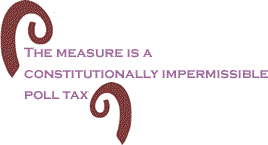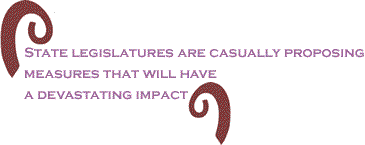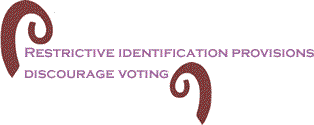
|
|||||||||||||||||||||
 |
|
State legislators are jumping on the voter identification bandwagon so quickly that these voter "integrity" initiatives have become a modern tool of voter suppression, much like poll taxes, white-only primaries, and grandfather clauses of the past. Whether deliberately or unknowingly, state legislatures are casually proposing measures that will have a devastating impact on poor, African-American and other minority voters. For months, Wisconsin has been pushing to join the ranks of states like Indiana, Florida and Georgia by mandating that voters provide a government-issued photo identification ("photo ID") to register or vote. Earlier versions of the proposed law were heard on the floor of the Wisconsin legislature on three separate occasions, and were rightfully vetoed by Governor Jim Doyle. The most recent attempt to override the Governor's veto failed by just one vote. Now in an unprecedented move, the legislature proposes to amend the state constitution to include a voter photo ID requirement ("Wisconsin Amendment"). Although, Wisconsin currently accepts 13 forms of identification at the polls (including allowing another voter to vouch for you), the constitutional amendment proposed in May, would prevent potential voters from registering or voting without a government issued photo ID. As drafted, the law is silent on whether individuals without photo ID would be allowed to cast provisional ballots as mandated by federal law, or whether, like South Dakota's photo ID measure, a voter could sign an affidavit swearing to their identity as a fail-safe means of voting.
Eighteen states require voters to show some form of identification to vote, but most offer options to voters in addition to government-issued photo ID, such as an utility bill, bank statement, paycheck or Social Security card. Arizona, Florida, Georgia, Indiana, Louisiana, South Carolina and South Dakota require voters to show a photo ID in order to vote. Georgia's law, the most restrictive measure thus far, requires voters to show one of six forms of government issued photo identification. Although the U.S. Department of Justice pre-cleared Georgia's measure, several civil rights organizations challenged the law in federal court and won a preliminary injunction to prevent the identification requirement from going into effect prior to November 2005 elections. The court found that plaintiffs have a likelihood of showing that the measure is a constitutionally impermissible poll tax.
Wisconsin's citizens should not take the exclusionary photo ID measure lightly. Restrictive identification provisions discourage voting, disproportionately disfranchise poor, elderly, and minority voters, and compound the existing social inequities confronted by those communities. As a result of past racial discrimination in education, housing and employment, the socioeconomic status of the state's Black citizens is markedly lower than the socioeconomic status of its white citizens. The effects of past discrimination hinder the current ability of African Americans to participate effectively in the state's political process. These individuals are less likely to have a car, therefore a driver's license, not to mention affording the fees for the necessary "feeder documents" required to get a license, such as a birth certificate or a passport. For them, the hurdles to overcome the means of participating in our democracy are simply too high. In this, the 40th anniversary year of the Voting Rights Act, it is disappointing that a state with a long tradition of expanding access to the franchise would abandon it in favor of a voter identification requirement with such stark consequences for many of its citizens. Wisconsin's State Legislature would do better to protect the vote and encourage voter participation rather than leaping blindly toward a potentially crippling and potentially unconstitutional voter suppression measure. Alaina Beverly is assistant counsel at the NAACP Legal Defense and Educational Fund, Inc. She can be contacted at [email protected]. |
|
| Home | |
Your comments are always welcome. Visit the Contact Us page to send e-Mail or Feedback or Click here to send e-Mail to [email protected] e-Mail re-print notice
If you send us an e-Mail message we may publish all or part of it, unless you tell us it is not for publication. You may also request that we withhold your name. Thank you very much for your readership. |
|
| December 1 2005 Issue 161 |
|||||||||
|
|||||||||
|
|
|||||||||
| Printer Friendly Version in Plain Text or PDF format. Download free Adobe Reader. | |||||||||
 |
|||||||||
 |
|||||||||
| |
|||||||||
| |
|||||||||


























